Dominate PPC & SEO with Our Free Keyword Niche Finder
Whether you work on the paid or organic side, keywords are foundational to search engine marketing (SEM). By enabling you to make your business visible in the search results, keywords give you the chance to meet your prospects precisely when they’re in need of your help.
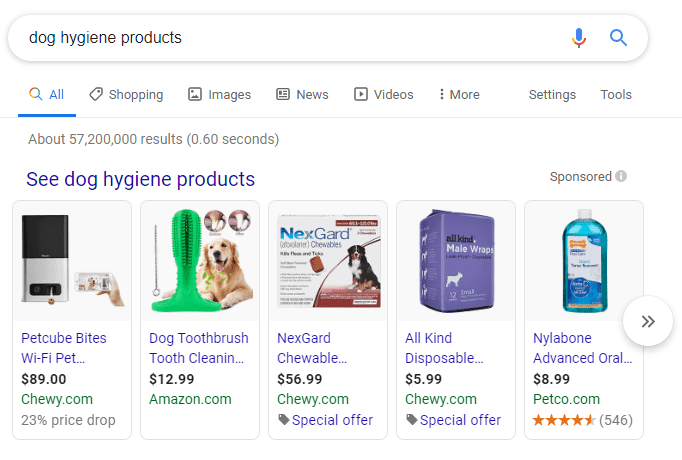
If you’re using PPC to meet your prospects, keywords are your tickets to the real-time auctions where you and your competitors duke it out for the coveted real estate at the top of the SERP (Search Engine Results Page). And if you’re using SEO to meet your prospects, keywords are essential to telling search engines what your content is all about—thus ensuring that your website attracts relevant users.
It’s not enough, however, to simply build a list of keywords and hit the ground running. The most successful search engine marketers—in PPC, as well as SEO, understand the importance of grouping together closely related keywords, or keyword niches.
Let’s get to the core of this guide. By the end of it, you’ll know:
- What keyword niches are
- Why they’re important for PPC
- Why they’re important for SEO
- How to find and build them
An easy, free keyword finder
Before you can identify your keyword niches, you need to find some keywords! That’s where WordStream’s Free Keyword Tool comes into play. Simply enter a broad term that’s related to your business, select your industry, and select your country. At no cost to you, the Free Keyword Tool will generate a list of highly relevant keywords that you can start putting to use right away. You’ll be finding your most valuable keyword niches in no time!
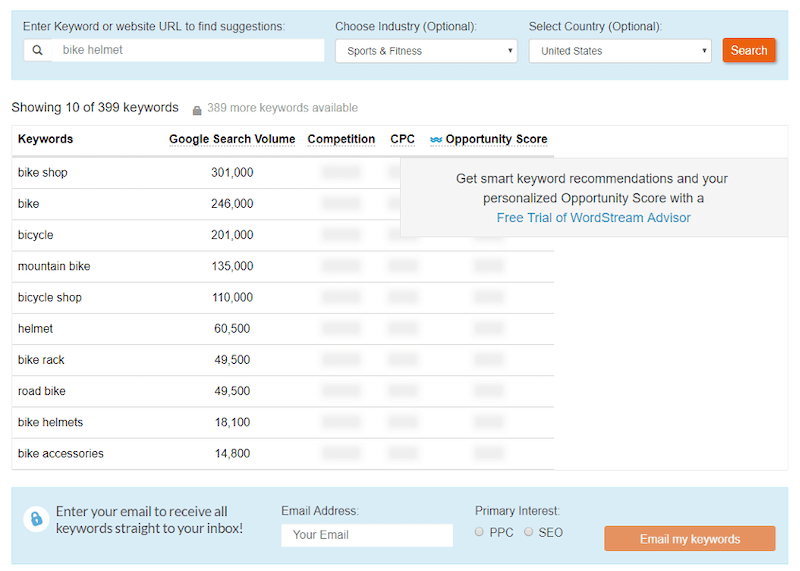
In order to get a complete sense of the keywords you can target—and to make sure you’re identifying as many valuable niches as possible—simply enter your email address and indicate whether you’re more interested in PPC or SEO. We’ll email the full list of keyword suggestions directly to your inbox!

If you still have questions about keyword niches, keep reading! We’ve got everything you need to know to get started.
What are keyword niches?
Keyword niches are groups of closely related keywords. As an example, let’s say you’re using SEM to promote affordable hiking gear. While conducting your initial keyword research, you could create a niche of the following keywords: “hiking backpack,” “backpack for hiking,” “best hiking backpack,” “cheap hiking backpack,” and “beginners hiking backpack.”
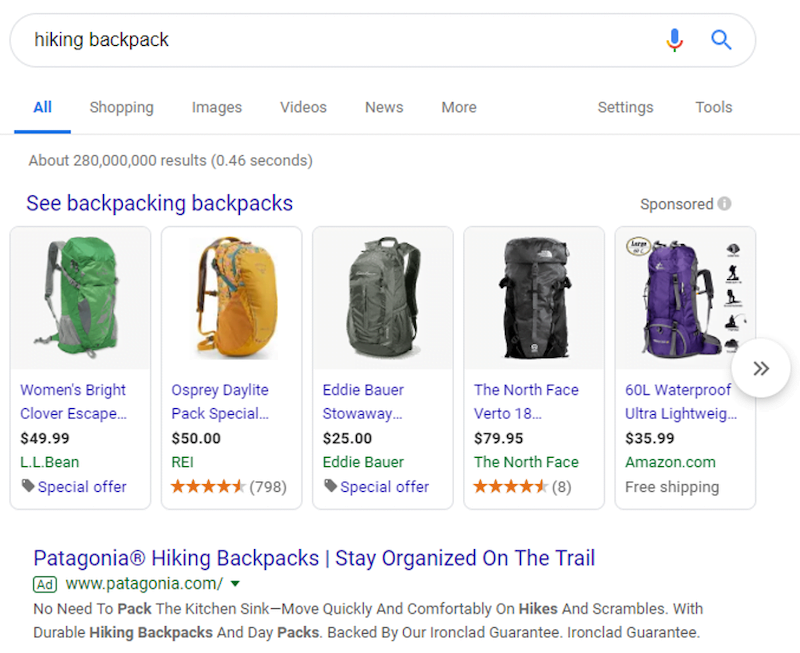
Although each of those keywords is unique, they’re all closely related to one another. More importantly, they all signify the same basic intent. Whether someone searches for “hiking backpack” or “backpack for hiking,” their intent is going to similar—they’re interested in hiking and want to find the appropriate backpack.
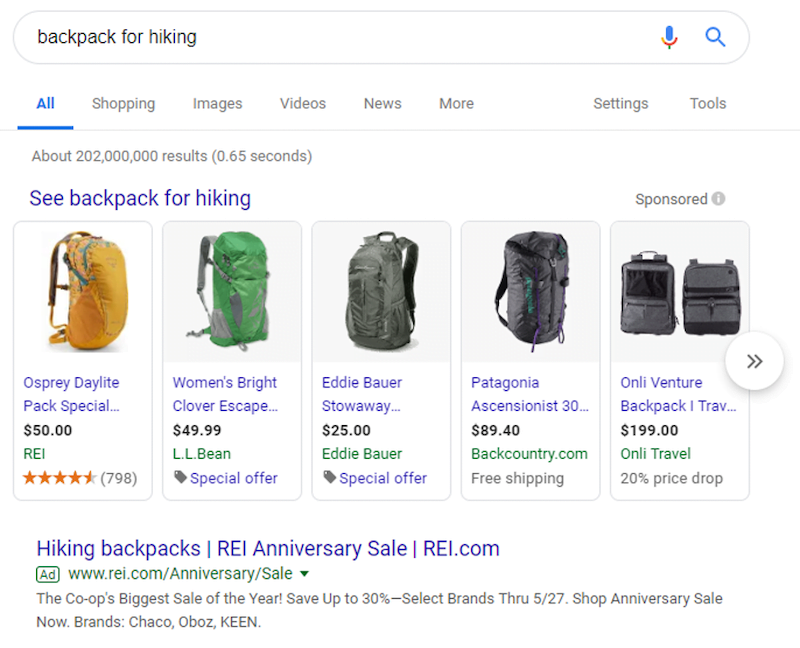
Recognizing the intent behind a keyword—as well as the common intent behind a group of keywords—is fundamental to the creation of relevant ads and website content. Let’s get more specific. We’ll first zoom in on PPC and then transition to SEO.
The importance of keyword niches for PPC
The basic hierarchy of a Google Ads account—from the broadest level to the most narrow level—is this: account > campaigns > ad groups > keywords & ads. You can check out the handy graphic shown below for a clearer illustration. For the purposes of this guide, the key piece of information is that your keywords and ads live inside your ad groups.
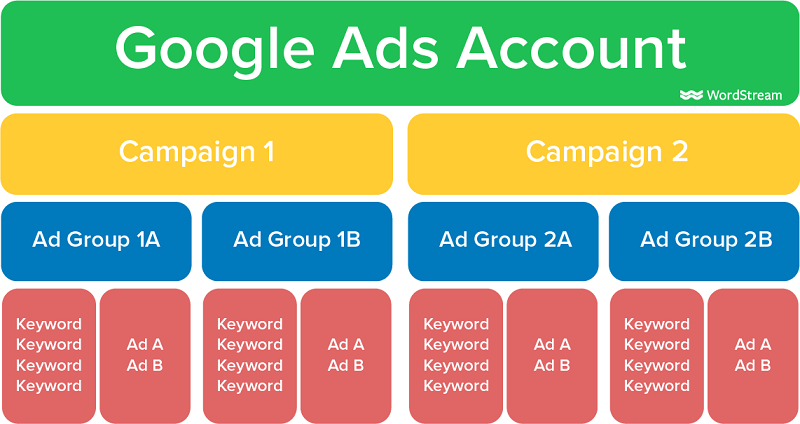
Google Ads houses your keywords and ads together in your ad groups for practical reasons. If you’re entered in the auction for a particular keyword and you win a placement, Google needs to know which of your ads to show to the user. By forcing you to house that keyword in the same ad group as, say, three specific ads, Google has a much easier time finding the right one.
Think of it this way: the keywords in your ad group are attached to the ads in your ad group. When a keyword is triggered, one of the ads it’s attached to is eligible to show to users. Accordingly, you need to write your ads such that each of them matches the intent behind each of the corresponding keywords. Otherwise, you risk serving completely irrelevant ads to your potential customers. As we explain in our guide to negative keywords, serving irrelevant ads leads to the lose-lose situation of wasted impressions and wasted money.
Keyword niches are incredibly valuable because—unless you’ve got the time to develop a successful SKAG strategy—it’s likely that the number of keywords in your ad group will be greater than the number of ads. You may find yourself with an ad group that contains a dozen keywords and only three ads. If those keywords are closely related to one another, it’s easy to make each of your three ads highly relevant. If those keywords aren’t closely related to one another, you’ll be at risk of serving irrelevant ads and wasting money.
TL;DR — Keyword niches enable you to optimize your Google Ads account structure and serve the right ads at the right times.
The importance of keyword niches for SEO
Now that we’ve covered the paid stuff, let’s turn our attention to organic stuff—SEO.
At the macro level, your ability to rank highly in the organic search results depends on a multitude of factors. To name a few: your site has to be crawlable, you have to earn backlinks from credible domains, and you need to structure your site in a logical manner.

Although there’s a multitude of ranking signals at the micro level as well, one of the most important—and the one we’re most concerned with at the moment—is keyword relevance. In the same way that keywords enable Google to connect search queries to relevant ads, keywords also enable Google to connect search queries to relevant web pages—homepages, product pages, blog pages, and so on. Because you want your web pages to feature prominently in the organic search results when a users’ queries signify interest in your business, a fundamental part of on-page SEO is targeting specific keywords.
Here’s the catch: a single web page can rank for several keywords. For example, let’s say you run a small business that sells health care products for dogs and SEO is your primary marketing channel. If you were to publish a well-structured, detailed blog post regarding the importance of brushing your dog’s teeth, it could very well rank for both “do i have to brush my dog’s teeth” and “best way to brush a dog’s teeth.” Pretty cool, right?
Although there’s certainly nothing wrong with inadvertently ranking for several keywords, it’s best to be proactive. This is where keyword niches come into play once again. By targeting a group of closely related keywords within a single piece of content or on a single web page, you improve your chances of ranking for each of the individual keywords.
TL;DR — Keyword niches enable you to target several closely related keywords within a single piece of content, thus giving that content a better chance of ranking for multiple keywords.
How to find & build keyword niches
Before you can start assembling your keyword niches, you need an initial set of keywords. If you don’t already have a master list, our Free Keyword Tool is the perfect solution. Simply enter a topic, identify your industry or niche, select the country you do business in, and boom—you’ve got yourself a list of keywords you can target.
Got your list? Awesome. Now, it’s time to start identifying those keyword niches. To begin, we recommend classifying each keyword according to two high-level characteristics: topic and intent. Topic, of course, simply refers to the general interest behind the keyword. For example, the topic behind the keyword “best way to brush a dog’s teeth” is dog hygiene. Intent refers to the goal the user is trying to achieve by searching on Google.
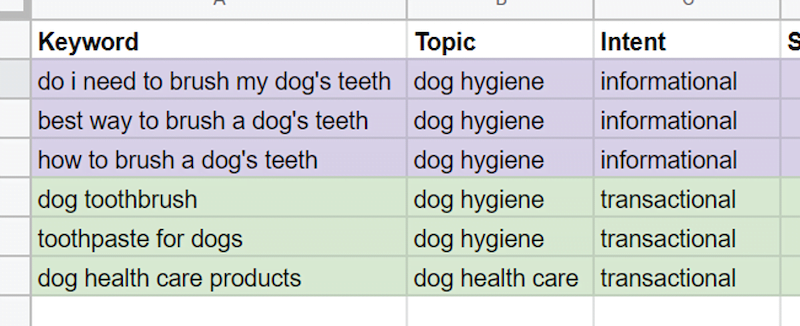
Generally speaking, there are three types of user intent:
-
Informational: When the user wants to learn more about a topic.
-
Navigational: When the user wants to go to a specific website or web page.
-
Transactional: When the user wants to buy something.
The intent behind the keyword “best way to brush a dog’s teeth” is most likely informational. Remember: you need the keywords within a given niche to signify the same basic intent so you can write the most relevant ads possible.
Once you’ve labeled each keyword according to topic and intent, you’re going to need two more pieces of data: search volume and competition. Whereas search volume tells you how often the users in your target country search for a particular keyword, competition tells you how difficult (or easy) it is to rank for that keyword. With this information, you’ll be able to quickly determine how valuable and viable each keyword is.

Now that you’ve got those four key pieces of data for each keyword, you’re ready to assemble your niches! Simply group together the keywords that address the same topics and signify the same types of intent and you’re ready to roll.
Start finding valuable keyword niches today!
Your success with search engine marketing—whether you focus on PPC or SEO—depends on your ability to get relevant offers and content in front of the right people. By identifying niches of keywords closely related to your business, you enable yourself to do exactly that.
Don’t procrastinate! Use the Free Keyword Tool to generate an initial list of keywords and start finding your most valuable niches today.
